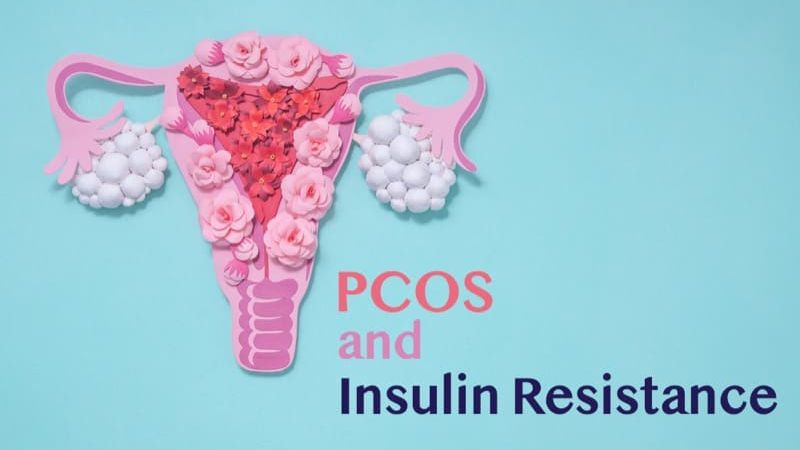Polycystic Ovary Syndrome (PCOS) is more than just irregular periods or a few extra facial hairs. One of the most misunderstood—and most damaging—factors associated with PCOS is insulin resistance. It’s a sneaky metabolic condition that often goes unnoticed but can cause chaos in your body if left unaddressed. Let’s dive in! 🌊
🤔 What Is Insulin Resistance?
Insulin is a hormone that helps your body absorb glucose (sugar) from your bloodstream into your cells for energy. Insulin resistance occurs when your cells stop responding properly to insulin, making your body produce more of it.
Over time, high insulin levels can:
- Lead to weight gain (especially around the belly)
- Trigger excess androgen production (hello, acne and facial hair)
- Disrupt ovulation and cause infertility
- Increase your risk for Type 2 Diabetes and heart disease
😱 PCOS + Insulin Resistance = Double Trouble
According to the CDC, insulin resistance affects about 70% of women with PCOS. The combination makes it harder to lose weight, maintain energy, and keep hormones balanced.
Your body basically says: “Let me store fat, disrupt ovulation, and crank up those male hormones all at once!”
⚡ Warning Signs of Insulin Resistance in PCOS
- Constant fatigue
- Belly fat that won’t budge
- Cravings for sugar or carbs
- Skin darkening (especially around the neck or underarms)
- Irregular periods
- Difficulty losing weight despite exercise
If these sound familiar, it’s time to take action. ⏳
📅 How to Manage Insulin Resistance Naturally
1. Balance Your Plate 🍽️
Include protein + fiber + healthy fats at every meal. Avoid high-sugar, processed foods. Know more about PCOS balancing diet by clicking here.
2. Choose Low-Glycemic Index Foods
Switch white rice with brown rice or millets. Choose whole fruits over juices.
3. Move More 🏃🏻♀️
Regular walks, yoga, or strength training can increase insulin sensitivity.
4. Sleep & Stress ☕😴
Poor sleep and chronic stress raise cortisol and worsen insulin resistance.
5. Consider Supplements (with professional guidance)
- Inositol (especially Myo-Inositol and D-Chiro-Inositol)
- Magnesium
- Omega-3 fatty acids
🌿 Ayurvedic Remedies to Support Hormonal Balance
Ayurveda sees PCOS as an imbalance in the Kapha and Vata doshas, along with Agni (digestive fire). Here are some time-tested remedies:
1. Triphala Churna – A gentle detoxifier that supports digestion and hormonal balance. Take ½ tsp with warm water at night.
2. Cinnamon (Dalchini) – Helps improve insulin sensitivity. Add a pinch to teas or warm water.
3. Fenugreek Seeds (Methi dana) – Soaked overnight and taken in the morning improves insulin response and menstrual regularity.
4. Shatavari – A powerful adaptogen that supports the reproductive system.
5. Ashwagandha – Helps lower stress and supports thyroid and insulin function.
6. Spearmint Tea – Traditionally used to reduce androgens and improve facial hair and acne.
✨ Always consult an Ayurvedic practitioner before starting herbs to ensure they are suitable for your body constitution (Prakriti).
😩 Long-Term Consequences (If Ignored)
Ignoring insulin resistance can lead to:
- Type 2 diabetes
- High blood pressure
- High cholesterol
- Non-alcoholic fatty liver disease (NAFLD)
- Anxiety and depression
So no, it’s not just about irregular periods. It’s about protecting your future health.
🙏 The Good News?
Insulin resistance can be reversed or managed with lifestyle changes — even if you have PCOS. The earlier you start, the better your chances of restoring hormonal balance, improving fertility, and avoiding long-term complications.
Take charge of your hormones today! 💪
References:
- CDC – PCOS and Insulin Resistance
- NIH – PCOS Fact Sheet
- Myo-Inositol for PCOS – PubMed
- Harvard Health – Insulin Resistance

Akanksha Sharma
Dr. Akanksha Sharma, Head Writer and creator of AtoZ of Pregnancy, is dedicated to empowering women, parents, and families through 360-degree knowledge. She and her team provide evidence-based advice to guide families through pregnancy, parenting and beyond.






